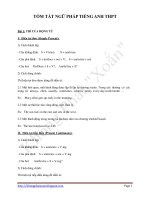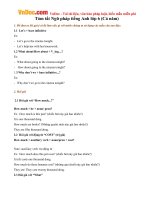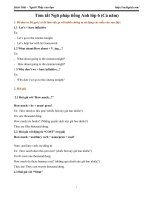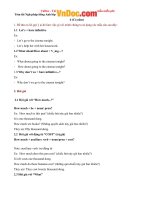TÓM TẮT NGỮ PHÁP TIẾNG ANH LỚP 8
Bạn đang xem bản rút gọn của tài liệu. Xem và tải ngay bản đầy đủ của tài liệu tại đây (214.48 KB, 5 trang )
Tóm tắt ngữ pháp tiếng anh 8
1. Present Simple and Present Progressive tenses (Thì hiện tại đơn giản và thì
hiện tại tiếp diễn)
Tenses Affirmation Negation Interrogation With
Present
Simple
(Thì hiện
tại đơn)
S + am/ is/
are
S + V(s/es)
S + am/ is/ are not
S + dont/ doesnt +
V
1
Am/ Is/ Are = S
+.?
Do/ Does + S +
V
1
?
Everyday ,always, usually, often,
never, hardly, in the morning/
afternoon/ evening/ in spring/
summer/ autumn/, On Mondays/ at
weekends
Present
Progressive
(Thí hiện
tại tiếp
diễn)
S + am/ is/
are + V-ing
S + am/ is/ are (not) +
V-ing
Am/ Is/ Are + S
+V-ing?
Now, at the present/ moment/ this time/
Look! Listen! Be careful! Be quiet!
Hurry up
2. Intended Future and Future Simple .( Thì tơng lai gần và tơng lai đơn giản)
Tenses Affirmation
(K)
Negation (P)
Interrogation
(NV)
With
Intended
Future
S + am/ is/ are
+ going to
+V
1
S + am/ is/ are+ not +
going to +V
1
Am/ Is/ Are + S +
going to +V
1
?
Tomorrow, soon, tonight, next, this
weekend, someday, in the future
Future
Simple
S+ will + V
1
S+ will not + V
1
Will + S + V
1
?
The differences between intended future and future simple: (S khỏc nhau gia
tng lai gn v tng lai n gin)
Intended future (Thì tơng lai gần) Future simple (Thì tơng lai đơn)
1. í nh ó c d trự, sp xp trc khi núi:
- I am going to visit New York this summer.
2. S suy oỏn chc chn da vo cn c hin ti:
- There are a lot of clouds. I think it is going to
rain.
1. í nh ngay khi núi hay hnh ng s xy ra tng
lai khụng ph thuc vo ý nh:
- He will come here tomorrow.
2. í kin, li ha, hy vng, phỏt biu v mt hnh ng
trong tng lai: (think, promise, hope, expect )
- Wait here and I will get you a drink.
- I think you will pass the exam.
3. Past simple tense( Thỡ quỏ kh n gin)
Tenses Affirmation Negation Interrogation With
Past
simple
S + was/ were
S + V
2
/ V
ed
S + wasnt/ werent
S + didnt + V
1
Was/ Were + S +
?
Did + S + V
1
?
Yesterday, ago, last, in 199 < 2008
Past habit: S + used to + V
1
* Diễn tả một thói quen trong quá khứ nhng nay không còn nữa
(He used to go swimming when he was young.)
4. Past progressive tense( Thỡ quỏ kh tip din)
Tenses Affirmation Negation Interrogation With
Past
progressive
S + was/ were
+ V_ing
S + wasnt/ werent
+ V_ing
Was/ Were + S +
V_ing ?
At this time yesterday(last week, last
month), when, while
5. present perfect tense (Thì hiện tại hoàn thành)
Tenses Affirmation Negation Interrogation With
Present
perfect
S + have/has +
V3
S + havent/hasnt
+ V3
Have/has + S+
V3 ?
just, recently, ever, never, already,
since, for, so far, yet, up to now
6. Enough to: S + be (not) + adj+ enough (+ for + O) + to Inf .
A. ng ch ng: Nam is not old. He is in my class.
Nam is not old enough to be in my class.
B. Khỏc ch ng: This book is very interesting. You should read it.
This book is interesting enough to for you to read. (b very
7. Adjective order in a noun phrase(Trật tự của tính từ trong một cụm danh từ)
(a/ an) size shape age color national material Noun
A big round old black Chinese wooden chair
8. Reflexive pronouns :( i t phn thõn hay nhn mnh)
Subject I you We They He she
Reflexive
pronouns
Myself
Yourself/
yourselves
Ourselves Themselves Himself Herself Itself
- Theo sau cỏc ng t (enjoy, look at, cut, dress, serve ); cho bit ch ng v tõn ng l mt
ngi
Oh. I cut myself. I look myself in the mirror.
- t ngay sau ch ng hay tõn ng b ngha cho ch ng hay tõn ng ú.
I myself was new here last year.
I saw Tan himself yesterday.
- t ngay sau t BY mang ý ngha l mt mỡnh.
You should do it by yourself.
9. Modal verbs ( Động từ khuyết thiếu) MUST - HAVE TO - OUGHT TO:
Must (Phải) Have to (phải) Ought to (phảI nên)
Diễn tả sự việc ngời nói ra
lệnh hoặc mong đợc thực
hiện
Diễn tả sự bắt buộc mạnh từ bên
ngoài
Diễn tả việc thực hiện lời khuyên theo trách
nhiệm nhng không chắc đợc thực hiện hay
không
I must take some pills
from the doctor.
I have to go to the bank to get
some money.
You ought to apologize him
10. Comparison: (So sánh)
Comparison Comparative (So sánh hơn) Superlative ( So sánh nhất)
Short adj
( tính từ ngắn)
S +V+ adj _er + than + S
2
small smaller; big bigger
S + V + the adj est + n
small the smallest; big the biggest
Long adj
( tính từ dài)
S +V+ more + adj + than + S
2
expensive more expensive
beautiful more beautiful
S + V + the most + adj + n
expensive the most expensive
beautiful the most beautiful
11. Commands, requests and invitations: (Câu mệnh lệnh, câu yêu cầu, câu mời)
Commands (Câu mệnh lệnh ) Requests (câu yêu cầu ) Invitations (câu mời()
Yêu cầu hay ra lệnh ai làm gì.
Bắt đầu là động từ nguyên
mẫu.
ở phủ định bắt đầu là Dont +
V1.
.
- Yêu cầu ai làm việc gì đó cho
mình Can/Could/ May /Might
you ?
- Đề nghị ,xin phép ai làm một việc
gì đóự.
Can/Could/ May /Might I ?
- Mời một ngời khác dùng một thứ gì
Will you have/ Would you like ?
-Mời một ngời thực hiện một việc gì.
Will/ would/ could you ?
Would you like to ?
- Go to the black board. - Can you lend me some money? - Will you have some tea?- Yes, please.
- Dont talk in the class. - Could I take photographs here? - Would you like to go now?- Id love to.
11. Commands, requests and invitations in reported speech: (Câu mệnh lệnh,
câu yêu cầu, lời khuyên trong cách nói gián tiếp)
Reported speech:
1. Affirmation commands: S+ told / asked B + to V
1
2. Negation commands: S+ told / asked B + not to
V
1
3. Requests: S+ told / asked+ B + to V
1
4. Advice: S + advised+ B + to V
1
-NgôI thứ nhất chuyển về cùng ngôI ngời nóii.
(I
he, she; me
him/ her; my
his, her )
-NgôI thứ hai chuyển về cùng ngôI ngời nghe
(you
I, we, he, she, they; you
me, us, him, her,
them; your
my )
-NgôI thứ ba không đổi ngôI (I, you, he, she, they)
This
That
These
Those
Here
There
Now
Then
Today
That day
Tonight
That
night
Tomorrow
The next/ following day
Yesterday
The day before
Next week / year
The following week /
year
Last week / year
The previous week / year
1. Mệnh lệnh KĐ: I said to Tom, Open the book for me.
I told / asked Tom to open the book for me.
2. Mệnh lệnh PĐ: The teacher said to us, Dont talk in class.
The teacher asked us not to talk in class.
3. Lời khuyên: He said to his son, You ought to do your homework
tonight.
He advised his son to do his homework that night.
4. Yêu cầu: Could you close this door? said Nam to me.
Nam asked / requested me to close that door.
12. Passive forms. ( Dạng bị động)
Quan sát:
- Câu chủ động : Mr Smith teaches English.
- Câu bị động : English is taught by Mr Smith.
Quy tắc:
- Tân ng ch đng -> ch ng b đng.
- ng t bị đng: Be + PII (ed/V3).
- Ch ng ch đng -> tân ng b đng ( trc có gii t by).
- Sơ đồ S V O
S + be + PII ( ed/V3 ) + by + O
Bảng tóm tắt các thì và động từ khuyết thiếu trong câu bị động.
Present simple S + am/ is/ are + PII ( ed/V 30 ) + ( by + O ).
Past simple S + was, were + PII ( ed/V 3 ) + ( by + O ).
Present
progressive
S + am/is/ are + being + PII ( ed/V 3 ) + ( by + O ).
Past progressive S + was/ were + being + PII ( ed/V 3 ) + ( by + O ).
Present perfect S + have/ has + been + PII ( ed/V 3 ) + ( by + O ).
Past perfect S + had + been + PII ( ed/V 3 ) + ( by + O ).
Future simple S + will + be + PII ( ed/V3) + ( by + O ).
Be going to S + am/is/are + going to + be + PII ( ed/V 3 ) + ( by + O ).
MODEL VERBS S + can/could/would/should + be + PII ( ed/V 3 ) +
(by+O ).
must/have to/may/might
13. CONDITIONAL SENTENCES (C©u ®iÒu kiÖn)
1./ Real conditional sentences in the present :Type 1 ( §iÒu kiÖn cã thËt ë
hiÖn t¹i)
If + S+ V(present simple) , S + Will + V (inf)
Eg : If you work harder, you will pass the next exam .
2./ Unreal conditional sentences in the present:Type 2 (§iÒu kiÖn kh«ng cã
thËt ë hiÖn t¹i).
If+ S+ V(past simple) , S + Would / could / should + V (inf)
Eg : - If I had a lot of money, I would travel around the world
- If he were you , he should help her.
*
N
o t
e :
1./ In the unreal condition : Be = Were with all persons
Trong c©u ®iÒu kiÖn kh«ng cã thËt: Be = Were cho tÊt c¶ c¸c ng«i
2./ Unless = If not
Eg : If you don’t go right away, you will not go to school on time
- Unless you go right away, you will not go to school on time
3./ VP + or + clause - unless + S + V , clause
Eg : Behave yourself or your parents won’t be happy
Unless you behave yourself, your parents won’t be happy
4./ Rewrite the sentences with
‘
I
F
‛
: ViÕt l¹i c©u víi
‘
IF
’
Present simple (+/- not) IF condition 2
Eg : If I don’t know the answer , so I can’t tell you.
-> If I knew the answer , I could tell you .









